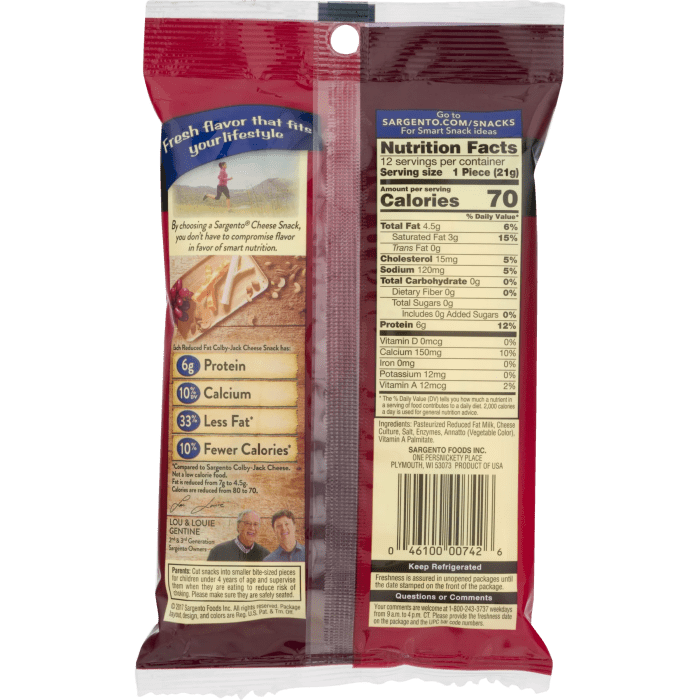Storage and Shelf Life: Tillamook Individual Cheese Nutrition Facts
Tillamook individual cheese nutrition facts – Proper storage is key to enjoying Tillamook individual cheeses at their peak flavor and texture. Different cheeses have varying shelf lives and optimal storage conditions, impacting their taste, texture, and nutritional value. Understanding these factors ensures you get the most out of your cheese.
Tillamook individual cheeses, like all cheeses, are perishable and require careful storage to maintain their quality. Improper storage can lead to mold growth, undesirable texture changes, and a loss of flavor. The length of time a cheese remains fresh depends on the specific variety and the storage environment.
Storage Methods for Tillamook Individual Cheeses
Maintaining the freshness of Tillamook individual cheeses involves keeping them at the correct temperature and humidity. Refrigeration is crucial; avoid storing them at room temperature for extended periods. Wrapping the cheese properly also helps prevent moisture loss and the absorption of unwanted odors.
For optimal preservation, wrap the cheese tightly in plastic wrap or place it in an airtight container. This helps prevent it from drying out or absorbing odors from other foods in the refrigerator. For longer storage, consider using cheese paper or parchment paper as an additional barrier before wrapping it in plastic wrap. This helps absorb excess moisture while still providing a protective layer.
Shelf Life and Spoilage Indicators
The shelf life of Tillamook individual cheeses varies depending on the type of cheese. Hard cheeses, such as cheddar, generally have a longer shelf life than softer cheeses, like cream cheese. Look for signs of spoilage to ensure you consume the cheese before it becomes unsafe to eat.
Signs of spoilage can include visible mold growth, an unusual odor (often sour or ammonia-like), slimy texture, or discoloration. If any of these are observed, discard the cheese immediately. Even if only a small portion shows signs of spoilage, it’s best to err on the side of caution and throw away the entire piece to prevent foodborne illness.
While some cheeses develop surface mold that can be trimmed away, it’s safer to discard Tillamook individual cheeses showing any signs of spoilage.
Impact of Storage Temperatures and Conditions, Tillamook individual cheese nutrition facts
Storing Tillamook individual cheeses at the correct temperature significantly impacts their quality. Refrigeration at temperatures between 35°F and 38°F (1.7°C and 3.3°C) is ideal for most varieties. Fluctuations in temperature can affect the cheese’s texture and flavor.
Higher temperatures accelerate the ripening process, potentially leading to faster spoilage and undesirable changes in taste and texture. For instance, a sharp cheddar stored at room temperature might become excessively crumbly and lose its characteristic sharpness much sooner than if stored properly refrigerated. Conversely, storing cheese at temperatures that are too cold can affect the texture, making it harder or more difficult to cut.
Top FAQs
Are Tillamook individual cheeses suitable for lactose-intolerant individuals?
While Tillamook cheeses contain lactose, the amount varies depending on the aging process and type of cheese. Some individuals with mild lactose intolerance may tolerate small portions, but it’s recommended to check individual product labels and consult with a healthcare professional.
What is the best way to store Tillamook individual cheeses to maximize freshness?
Store Tillamook individual cheeses in the refrigerator, ideally wrapped tightly in plastic wrap or placed in an airtight container. This helps prevent them from drying out and maintains their flavor and texture.
How long do Tillamook individual cheeses typically last?
The shelf life of Tillamook individual cheeses varies depending on the variety and storage conditions. Generally, they will last for several weeks when properly refrigerated. Look for signs of mold or off-odors as indicators of spoilage.
Are Tillamook individual cheeses suitable for vegetarians?
Yes, Tillamook individual cheeses are generally suitable for vegetarians as they do not contain any animal products beyond milk.
So, you’re checking out Tillamook individual cheese nutrition facts, huh? Pretty standard stuff, right? But if you’re also curious about the nutritional breakdown of something a bit different, check out this link for cottage cheese nutrition info – it’s a good comparison. Then you can really get a feel for how the Tillamook cheese stacks up, you know, for your next snack attack.



